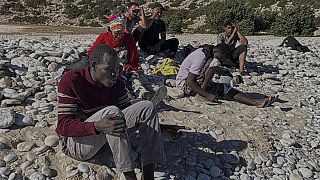Libya
Suspected Islamist militants killed two workers and kidnapped two others at a water plant in southeastern Libya early on Saturday, the second attack targeting water facilities in two days, officials said.
“An armed attack was carried out by terrorist groups on the Tazirbu site causing havoc, looting, killing and terrorising families, children and the workers who ensure the supply of water to cities,” said a statement from the Great Man-made River Project, a pipe network supplying ground water from the Libyan Sahara.
An engineer and a guard were shot dead and two guards were kidnapped in the raid, which the statement said bore the hallmarks of an attack by Islamic State militants. The assailants also stole cars and supplies from the site, the statement added.
Libya’s oil output down to 315,000 bpd as exports blocked
On Friday, members of an unidentified armed group kidnapped three Filipinos and one Korean employed as technicians at the Al-Hassouna plant, part of the same water network connecting desert wells to towns and cities in northern Libya.
The Al-Hassouna and Tazirbu sites are about 1,000 km (620 miles) apart, an official said.
Separately, an Islamic State publication, Al Naba, said on Friday it had captured two air force officers from forces loyal to eastern-based commander Khalifa Haftar.
It published a picture of the two men standing handcuffed in orange jumpsuits, and said they had been taken to the east of the town of Waddan, in Libya’s central desert.
Officials from Haftar’s Libyan National Army said they could neither confirm nor deny the report.
Militants linked to al Qaeda and Islamic State have carried out operations across Libya. Islamic State lost its coastal stronghold of Sirte to local forces backed by U.S. air strikes in 2016, and in recent months militants have been most active in remote desert areas.
REUTERS














01:08
Al-Shabab fighters seize central Somali town, displacing thousands
00:53
One year on from Trump assassination attempt, second suspect readies for trial in Florida
Go to video
Greece cracks down on irregular migration, says it’s "not an open corridor to Europe"
01:50
UN urges renewed political and climate action in Libya amid humanitarian and governance crises
Go to video
Over 40 killed in attack on Sudanese hospital: WHO Chief condemns “Appalling” strike
Go to video
Mali: Army foils attack in Timbuktu, a day after jihadist assault killed 30 soldiers